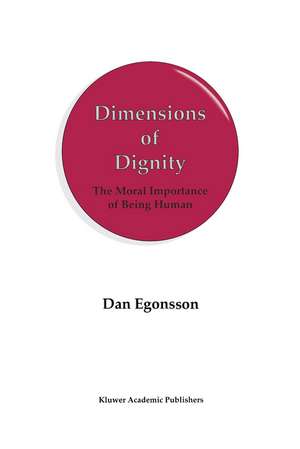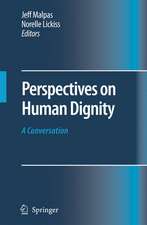Dimensions of Dignity: The Moral Importance of Being Human
Autor D. Egonssonen Limba Engleză Paperback – 4 oct 2012
| Toate formatele și edițiile | Preț | Express |
|---|---|---|
| Paperback (1) | 639.25 lei 6-8 săpt. | |
| SPRINGER NETHERLANDS – 4 oct 2012 | 639.25 lei 6-8 săpt. | |
| Hardback (1) | 645.47 lei 6-8 săpt. | |
| SPRINGER NETHERLANDS – 30 iun 1998 | 645.47 lei 6-8 săpt. |
Preț: 639.25 lei
Preț vechi: 752.06 lei
-15% Nou
Puncte Express: 959
Preț estimativ în valută:
122.32€ • 128.04$ • 101.81£
122.32€ • 128.04$ • 101.81£
Carte tipărită la comandă
Livrare economică 31 martie-14 aprilie
Preluare comenzi: 021 569.72.76
Specificații
ISBN-13: 9789401060882
ISBN-10: 9401060886
Pagini: 256
Ilustrații: XI, 256 p.
Dimensiuni: 155 x 235 x 20 mm
Greutate: 0.39 kg
Ediția:1998
Editura: SPRINGER NETHERLANDS
Colecția Springer
Locul publicării:Dordrecht, Netherlands
ISBN-10: 9401060886
Pagini: 256
Ilustrații: XI, 256 p.
Dimensiuni: 155 x 235 x 20 mm
Greutate: 0.39 kg
Ediția:1998
Editura: SPRINGER NETHERLANDS
Colecția Springer
Locul publicării:Dordrecht, Netherlands
Public țintă
ResearchCuprins
I: Problem and Method.- 1. Introduction.- 2. Methodological Background.- II: Direct Importance.- 3. A “Standard Attitude” (SA).- 4. The Direct Value of Being Human.- 5. SA Examined.- 6. Elements in The Phenomenology of SA.- 7. Tooley’s Arguments Against SA.- 8. Examples Supporting SA.- 9. Critique of Arguments for SA.- III: Indirect Importance.- 10. Peter Carruthers’ Contractualism.- 11. Peter Singer on Killing Persons and Non-Persons.- Summary and Conclusions.- References.
















